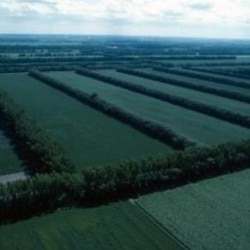This is the VOA Special English Agriculture Report.
Soil conservation methods help farmers protect their land from the damage caused by farming and the forces of nature. One method of soil conservation is the use of windbreaks. Windbreaks are barriers formed by trees and other plants. Farmers plant these barriers around their fields.
Windbreaks help prevent the loss of soil.
(SOUND)
They stop the wind from blowing soil away. They also keep the wind from damaging or destroying crops.
Windbreaks can be highly valuable for protecting grain crops. For example, studies have been done on windbreaks in parts of West Africa. These studies found that grain harvests were as much as twenty percent higher in fields protected by windbreaks compared to fields without them.
But here is something interesting about windbreaks. They seem to work best when they allow some wind to pass through the barrier of trees or plants around a field. If not, then the movement of air close to the ground will lift the soil. Then the soil will be blown away.
For this reason, a windbreak works best if it contains only sixty to eighty percent of the trees and plants that would be needed to make a solid line. An easy rule to remember is that windbreaks can protect areas up to ten times the height of the tallest trees in the windbreak.
There should be at least two lines in each windbreak. One line should be large trees. The second line, right next to it, can be shorter trees or other plants with leaves. Locally grown trees and plants are considered the best choices for windbreaks.
Studies have shown that some kinds of trees can grow well even if the quality of the land is not very good. One kind of tree is the white pine. Another is the loblolly pine.
Windbreaks not only protect land and crops from the wind. Surplus trees can be cut down and used or sold for wood.
(SOUND)
Trees reduce the damaging effects of wind and rain. Their roots help protect soil from being washed away. And trees can provide another valuable service for agriculture. They can provide grazing animals with shade from the sun.
And that's the VOA Special English Agriculture Report. You can learn English and stay informed with our programs at voaspecialenglish.com. You can get more information about windbreaks and other forms of soil conservation at enterpriseworks.org. I'm Jim Tedder.





